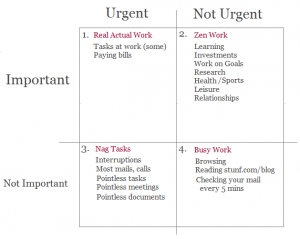A big problem when it comes to task management and planning is assigning priorities.
Don’t you just love software that presents you with a lot of priority options when adding a new task? For example, you can set the priority to ‘Important’, ‘Medium’, ‘A little bit medium’, ‘Something less medium’, ‘Not so medium’. Sometimes these priority-levels are expressed as numbers, which is even “better”! Priority of this task? 7. No. Wait. It’s 6, yes that’s it. Or maybe 8.
Not very helpful.
To figure out the priority of a task, I look at two factors: Urgency and Importance. This is based on a well known concept in Time Management, Covey’s 4 Quadrants. In this concept, tasks are split up into four different categories:
1. Important and Urgent
2. Important and Not Urgent
3. Not Important and Urgent
4. Not Important and Not Urgent
A lot of people sort their Todo List by Urgency (i.e. due date). This is where it goes wrong. The key is that Urgency says nothing about Importance. An urgent task can be important, but it doesn’t have to be.
It’s pretty clear that tasks that are urgent and important should be done right away (Real Actual Work). So which task will you pick next if your tasks are sorted by due date? Tasks from category 3 – Nag Tasks, because they are also urgent. But didn’t category 3 say ‘Not Important’? It sure did. So why am I working on this? Simply because there’s some feeling of urgency to these tasks.
The Nag Tasks (3) are the worst kind of tasks. They usually don’t help your long term goals and interrupt you from important things. There’s just too much of this stuff: writing useless emails or documents, or pointless assignments. To make it worse, after working an entire day on category 3 tasks, you feel like you did a lot of work but didn’t really achieve anything. It didn’t help you get closer to your goals.
So, after working on Real Actual Work-tasks, you should start on tasks in category 2 (“Zen Work”). This forces you to eliminate (or delegate) as much as possible of category 3 tasks, or postpone them until you’ve done enough work in category 2. Many category 2 tasks have to do with achieving long term goals, whether it is brainstorming about new ideas, building relationships, doing research or simply relax to become more productive.
The ordering of tasks in Thymer allows for a mix of using deadlines and the importance you assign to a task. Adding deadlines to tasks will automatically sort them if you want, but they can simply be dragged into a new planning that better reflects the importance. A special flag is available to mark certain tasks as extra ‘important’.
Here’s an example of a todo list, in which some todos have deadlines, some have not. Some deadlines will be missed, as the tasks are not really important.


One of the key differentiators between most online task management applications is priority. Some of the methods choose the priorities for you, which is helpful to people who are having problems prioritizing tasks. Other methods will let you customize the priorities, so you can set them exactly as you like. Either way, fewer priorities is always better. A clear distinction like you’ve outlined above makes it so much easier to decide what to do and when.
Nice. Basically, focus on long-term goals, but do what is necessary to maintain yourself. For example, paying your rent is menial task, but important, of course. Your long term goal may not be financial, but what’s necessary to maintain yourself, your home, and your family, is. How do you balance the two?
Unparalleled accuracy, uqneuiocval clarity, and undeniable importance!
Thanks for the comments. Sure, there’s always a catch and balance is key. That’s where it helps to set goals for yourself, and make trade-offs. What’s most important to you? What do you really need to maintain yourself? Those tasks keeping me from working on my long term goals, are they really necessary (is it really important, or just a nag task). Say no sometimes. Try to eliminate and delegate where possible. If you must work on category 1 tasks, focus on the tasks that bring you the most value in the shortest time and consider dropping a few that bring little value (i.e. re-evaluate their importance). Maybe the slight short-term decrease in revenue, salary or whatever is worth the extra time you gain to spend on long-term goals, which can eventually be more rewarding. The ideal situation would of course be that in the end you enjoy working on almost all tasks, and that even the urgent ones somehow help your long term goals.